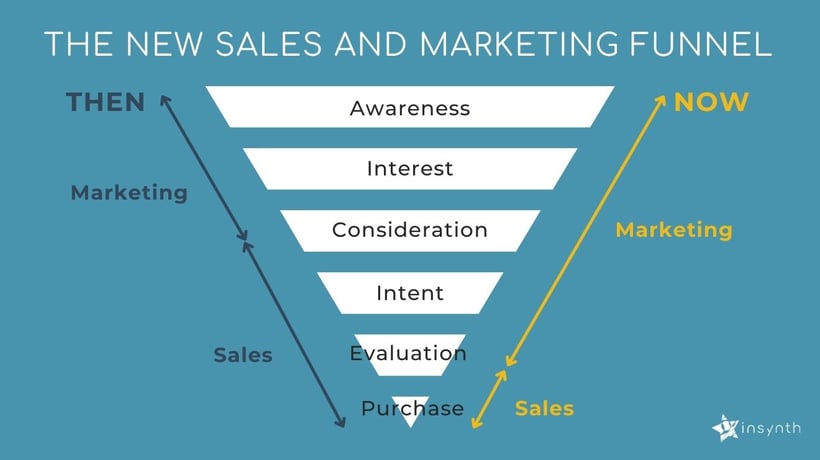
It’s a polarising question.
I’m sure you have your immediate thoughts of whether Marketing and Sales should be one department or if they can only work effectively as separate teams.
I recently saw a LinkedIn post on this very subject and the comments were wild with differing thoughts and opinions. One that really struck me was the idea that Marketing should even run Sales. Astounding, I know.
As with anything to do with business philosophy, and even business strategy and planning, different things will work for different businesses.
So, in this article we will discuss whether Sales and Marketing should be one department and if they were – what would the benefits be to building product businesses, like yours?
Why the Line Between Sales and Marketing is Blurring
In the last two decades, the growth of the online marketplace and e-commerce has been a major shift towards marketing – now digital marketing – being more than just TV commercials and magazine ads.
Ten years ago the Harvard Business Review posted an article projecting their forecasts for the future of the role of Chief Marketing Officer (CMO). In it, they state that this role would evolve to become “a single point of contact for the commercial side of the business, who can manage innovation, product development, marketing, and sales—across all platforms, both digital and brick-and-mortar.”
This forecast seems truer than ever, with roles such as Chief Digital Officer and Chief Commercial Officer becoming more common than ever.
E-commerce has forced sales leaders to grapple with responsibilities that previously fell to marketing, and vice versa, with the lines between sales and marketing still continuing to blur.
The graphic below shows this shift as exampled by the standard model of the sales and marketing funnel.

You can see perhaps why that previous person I mentioned above feels Marketing should run Sales. More of the funnel than ever is the responsibility of Marketing, and the power that Sales may previously have held seems to definitely be swaying further towards Marketing.
In this modern, digital era, it is no longer acceptable to run a business with sales and marketing departments running in silos. When businesses consolidate the two they can more easily focus on the real goal of both sales and marketing – serving the needs of their clients and customers.
The whole process needs both hands on deck.
The Pros and Cons of Sales & Marketing Being One Department
There are many reasons why Sales and Marketing teams can be misaligned. Usually, it traces back to the issue that they are under different mandates, have different goals, and are tracked using differing metrics.
There can also be tensions that arise between the two teams – “Well, I did my part”.
If these are the sort of issues in your business, you may want to glance over our recent article, ‘5 Red Flags that your Sales and Marketing Teams are Misaligned’.
Many commentators on the subject, therefore, recommend that the two teams shouldn’t work like this any longer, and should more appropriately work in the same team, for the same goals – perhaps being renamed “Client Acquisitions” or something of the sort.
However, on the other hand, we can also dig deeper into the responsibilities each department hold.
Marketing is all about getting the word out and explaining to people the benefits of your products and services to increase interest and visibility. Most importantly, marketing is about driving inquiries and leads to sales. A sales department is for nurturing clients, progressing with leads, and keeping up a constant and steady relationship.
Of course, the two are related. Marketing is essential for facilitating the sales process.
But the two departments are simply too critical to the success of your company that they need to be fully staffed by people who are experts in doing one or the other. You will appreciate the two working independently with the ability to work in partnership if they need to.
What’s the Answer Then?
I think this set of data may reveal just the solution:
- 25% of businesses describe their sales and marketing as either “misaligned” or “rarely aligned”
- 55% of marketers don’t know which assets their Sales co-workers are most likely to use
- Three in five marketers believe they understand what Sales require from them, but only one in three salespeople agree
The modern sales and marketing funnel demands better collaboration and communication between Sales and Marketing – perhaps better known as Sales and Marketing alignment.
What Happens When Sales & Marketing Work Together?
“When Sales and Marketing work well together, companies see substantial improvement on important performance metrics: Sales cycles are shorter, market-entry costs go down, and the cost of sales is lower.” 2006 Harvard Business Review
Proper alignment between sales and marketing could lead to a staggering 208% jump in marketing revenue, as well as 38% higher win rates and 36% better customer retention.
When separated and left to focus on each of their respective strengths, sales and marketing can work to improve both the current and future status of a business, allowing it to continuously build relationships with customers and grow.
Conclusion
The building product and construction industry leans heavily towards investing in sales teams, often forgetting all about marketing. In today’s internet era, being found on Google is so incredibly crucial that more businesses are starting to realise that it's as much about your online presence (and how you market yourself) as it is about sales.
As long as they are both working together, the answer to the question: should Sales and Marketing be one department is no – not necessary!
Want to learn more about sales and marketing alignment for your building products or construction business? Read our Complete Guide to Sales and Marketing Alignment here.
About Insynth
At Insynth we deliver a predictable flow of leads, customers, and specifications for building product brands through our inbound marketing approach, proven to reach a technically demanding audience.
We use the latest marketing techniques such as construction inbound marketing, to equip building product companies to grow sustainability in this era of digital transformation.
As the only HubSpot certified agency to major in construction marketing. We have a proven formula of bringing a variety of functionalities together including CRM Implementation, Web Design, Sales Automation, SEO, and Email Marketing to achieve your ultimate aim: Growing your business and gaining new specifiers and customers.

